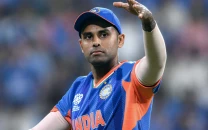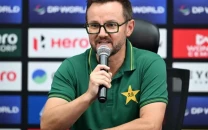Qatar versus Red Bull -- a Champions League semi-final for the 21st century
Either Paris Saint-Germain or RB Leipzig will reach the Champions League final for the first time

Either Paris Saint-Germain or RB Leipzig will reach the Champions League final for the first time this midweek but the prospect of these hugely ambitious clubs clashing in the last four in Lisbon may be a turn-off for many football fans.
When UEFA president Aleksander Ceferin spoke to AFP last week about the future of elite European football, he observed that the sport had become "a different thing to what it was 10 years ago, let alone 20 years ago".
Ceferin was speaking specifically about the need to change the Financial Fair Play rules after Manchester City's successful appeal against a two-year Champions League ban.
But his point was about much more than that.
Ten years ago Inter Milan won the Champions League, beating Bayern Munich in the final. Bayern had defeated Lyon in the last four.
Those teams meet again in the semis on Wednesday after Lyon's unexpected success against City, who have not yet made the Champions League final 12 years on from the Abu Dhabi takeover of the club.
Also in 2010, PSG won the French Cup but finished 13th in Ligue 1. They were going nowhere fast. Leipzig, meanwhile, had just made their way up to the fourth tier of German football.
In 2011, PSG were bought by the state-funded Qatar Sports Investments and have gone on to trample over the competition in France, winning Ligue 1 in seven of the last eight years.
- World record transfers -
They paid the two biggest transfer fees in history to sign Neymar and Kylian Mbappe in 2017 and it is a wonder it has taken them this long to reach a Champions League semi-final again, 25 years after their first and last appearance.
"It is very special. It is the first time we have made it to the semi-finals. It is history for the club," said PSG president Nasser Al-Khelaifi after their quarter-final win over Atalanta, a remark that gave the impression it was a different club that lost to AC Milan in the 1995 semis.
In most ways it was. PSG are now the fifth richest club in world football, according to Deloitte's Football Money League. Their revenue in 2018/19 was 635.9 million euros ($753 million).
Fans of other clubs sometimes laugh about PSG lacking tradition, given they were only founded in 1970. But they are veritable old-timers compared to Leipzig.
- Unpopular -
The German club was only founded in 2009 when energy drinks giant Red Bull bought the licence of fifth-division minnows SSV Markranstadt, creating RasenBallsport Leipzig.
'RasenBallsport' is a fabricated German word, a way of getting around Red Bull's problem that, under German Football League (DFL) rules, a team may not carry a sponsor's name.
They also navigated their way around the DFL's so-called '50+1' rule in place to prevent any individual having a controlling stake in a club.
Red Bull, founded by Austrian billionaire Dietrich Mateschitz, owns 49 percent, with the remaining 51 percent owned by company employees.
Even before they first appeared in the Bundesliga in 2016, Leipzig were hated by supporters of other clubs.
Dynamo Dresden fans threw a severed bull's head onto the pitch during a game between the teams. Borussia Dortmund fans have boycotted matches against Leipzig in protest at the club's ownership structure.
Unlike PSG, Leipzig's footballing model places the emphasis on signing and developing talented youngsters.
Nevertheless, cult German football magazine 11Freunde responded to Leipzig's quarter-final win over Atletico Madrid by saying it would not cover their semi-final.
"RB Leipzig is a pure marketing project. Created solely to strengthen the Red Bull brand," it wrote, calling the club "an imitation".
The Red Bull stable also owns Salzburg, who also appeared in this season's Champions League, New York Red Bulls, and Red Bull Bragantino, who have just reached Brazil's top flight.
In Leipzig, RB have at least revived a tradition of footballing success -- Lokomotiv Leipzig, a leading club in the old East Germany, were UEFA Cup semi-finalists in 1974 and Cup Winners' Cup runners-up in 1987.
Both PSG and RB Leipzig are now within touching distance of the Champions League final, but neutral support could be thin on the ground.



















COMMENTS
Comments are moderated and generally will be posted if they are on-topic and not abusive.
For more information, please see our Comments FAQ